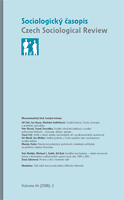Rozdílné mechanismy – stejné nerovnosti: Změny v determinaci vzdělanostních aspirací mezi roky 1989 a 2003
Different Mechanisms – the Same Inequalities: Changes in the Determinants of Educational Aspirations between 1989 and 2003
Author(s): Josef Basl, Michael L. Smith, Petr MatějůSubject(s): Social Sciences
Published by: AV ČR - Akademie věd České republiky - Sociologický ústav
Keywords: educational aspirations; social stratifi cation; social inequalities; social change; Czech Republic
Summary/Abstract: The article focuses on the changes in the determination of educational aspirations that took place in the Czech Republic during its social, political and economic transformation. The aim of the article is to contribute to a deeper understanding of the changes in the stratifi cation system after 1989, which were significantly influenced by changes in the causal mechanisms behind the formation of educational aspirations. Those changes in the determinants of educational aspirations were themselves largely driven by the expansion of economic returns to education and thus the increasing significance of education for life success. The empirical research is based on a comparison of data from the ‘Family ‘89’ (Rodina ’89) survey conducted in January 1989 and the Czech module of the longitudinal survey PISA-L 2003. The analyses were carried out with the hypothesis that the social origin of the background family had a much stronger direct impact on the educational aspirations of adolescents in 1989, while in 2003 social origin had a much stronger indirect influence. The stronger direct impact in 1989 was due to the very limited access to higher education under socialism and the role higher education played in the reproduction of the cultural elite. But with the gradual expansion of, and the rapidly increasing returns to, higher education during the transition period, social origin began to have a largely indirect effect on aspirations, particularly through the value pupils began to place on higher education as a means of ensuring a higher degree of life success. The authors’ empirical fi ndings confirm the hypothesis about the change from direct to indirect effects and highlight the importance of researching educational aspirations from a historical point of view and in the context of social change.
Journal: Sociologický časopis / Czech Sociological Review
- Issue Year: 44/2008
- Issue No: 02
- Page Range: 371-399
- Page Count: 29
- Language: Czech

